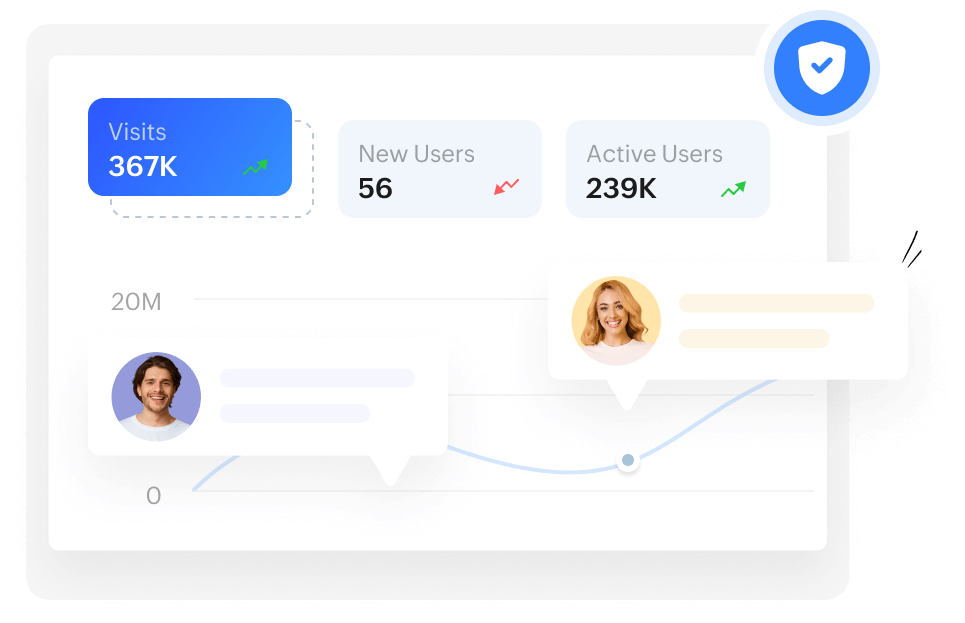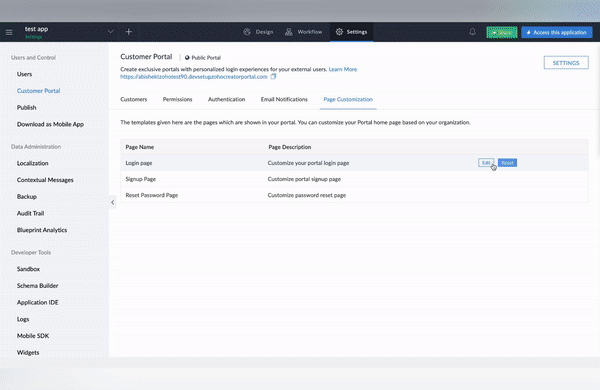Top brands that use our platform
One-stop access for your customers
Customer portals act as secure gateways, offering external users like customers, vendors, and partners a single point of access to your company’s products, services, and information.

Why does your business need an online customer portal?
With a dedicated hub at their disposal, your end users can find exactly what they’re looking for, just when they need it. With a customer portal, these users can get context-specific access to applications, find help, post questions, access resources, and raise support requests.
An online customer portal allow users to interact directly with support processes and manage data relevant to them, like policies, schedules, invoices, deliveries, orders, and online payments.
By giving users their own login credentials, you not only deliver a more personalized experience but also help them become a part of your company. And portals already have built-in authentication and security mechanisms in place. So once your portal is set up, clients can simply sign up and log in—it's that easy!
Boost your business value with a customer portal
Besides the benefit of driving down service costs, a customer portal is also a key productivity tool and customer-experience element. And the benefits don't end there:
One place for everything
A responsive online customer portal delivers a unified, self-service experience that addresses all user needs, removing the need to look elsewhere for help. With round-the-clock accessibility and zero wait time, users can resolve their issues instantly.
From business websites to PWAs
Portals are readily available as progressive web apps or native mobile apps, downloadable with a click. Portal applications are responsive and engaging, like mobile apps, and discoverable like web pages—and they run on both desktop and mobile devices.
Granular access control
A customer portal enables you to establish authentication protocols and access controls, ensuring secure data management. Permissions can be configured directly within the portal, tailored to each user's role and scope of work.
Up-to-date customers
With a customer portal, users can be granted exclusive access to product release notes, new feature announcements, version changelogs, and other key product information. You can also set up mechanisms on portals to gauge user satisfaction, get reviews, handle referrals, and even cross-sell.
Integration capabilities
Online customer portals integrate with various third-party applications, databases, and backend systems. These integrations enable businesses to provide external users with a seamless experience for tasks like making payments, accessing account details, and more.
Design an ideal portal for your business with Zoho Creator's customer web portal builder
- Customer portal
- Partner/vendor portal
- Candidate portal
- Student portal
- Patient portal
- Public portal
Customer portal
An online customer portal allows businesses to provide a personalized experience for their customers. Users can log in to view their account details, check order history or project status, track deliveries, make payments, and communicate with customer service or support teams. With Zoho Creator, you can design a customer portal that mirrors your brand and ensures a seamless experience for your customers.

Partner/vendor portal
Online portals for partners streamlines onboarding, partner performance tracking, deal registration, exchanging product information, managing orders, and monitoring sales performance. They also improve procurement operations by providing a platform for vendors to submit proposals, manage contracts, and track payments, thereby enhancing transparency and efficiency in vendor management.

Candidate portal
A portal for candidates simplifies the hiring process significantly. Zoho Creator’s candidate portal ensures a seamless and interactive recruitment experience, allowing candidates to submit their resumes, track the progress of their applications, and communicate directly with the hiring team.

Student portal
Zoho Creator's student portal enhances student engagement and facilitates effective learning management by providing a centralized platform for students to access course materials, submit assignments, and communicate with instructors.

Patient portal
An online portal for patients allows healthcare providers to enhance patient engagement and provide personalized care. Patients have the ability to view their medical records, book appointments, and communicate with healthcare professionals. Zoho Creator's patient portal improves the patient experience and streamlines healthcare operations.

Public portal
A public portal empowers individuals to organize public services, such as applying for permits, licenses, certificates, and public records, all from the convenience of their homes.
Additionally, residents can stay informed about policies and updates, report issues, and engage in direct dialogue with government agencies. This portal streamlines administrative processes, enhances citizen interaction, and fosters transparency, ultimately contributing to better public accessibility.

Elevate your portal experience with advanced customization
Choose a striking design for each of the key pages in the user lifecycle—login, signup, and password reset. With the portal page designer, you can fully customize each of these pages to match your online service’s UI and align with your business vision. Every element of your customer portal page is customizable, allowing you to craft a personalized experience for your users.

Try Zoho Creator's feature-rich customer web portal builder
Zoho Creator portals simplify the way line-of-business apps are shared and used by people outside the organization. Let's see what makes Creator's customer portals ideal for your business:
Watch a video
Custom domain
Design portal pages that behave like a natural extension of your company's website. You can also host your support portal on your own domain, to be accessed from your business website instead of Zoho Creator's.
Multiplatform customer portals
With a fully responsive design, portals can be accessed smoothly on both computers and mobile devices. You can also keep your users connected and informed through web, email, and mobile push notifications.
Retain brand identity
Portals are a great way for a business to present applications that match their brand—with personalized logos, visual elements, and a customized look and feel.
Complete access control
Choose how and when users access your service offerings. Have product data that should only be accessed by logged-in users or users on specific payment plans? Set up access controls before launching your portal, so that each user can only access their own database. You can also select your portal type based on the users it's aimed at.
Efficient user management
You can add portal users individually, or import them in bulk and group them based on approval status. Define individual access permissions for user profiles—to read, write, edit, and comment on the data available in your portals—based on their scope of work. You can also add users dynamically using scripts.
Strong authentication mechanisms
Perform centralized management of user authentication and access rights. Choose between two different authentication mechanisms—single sign-on (SSO) using a third-party identity provider or federated logins (Google, Facebook, and Apple)—or simply use Zoho's own login.
Customizable notification preferences
Set up personalized email notifications to communicate more effectively with your users.
Configuring Google Analytics for portals
Leverage Google Analytics to gain valuable insights into your portal's performance, including user behavior across your online customer portal's pages, real-time engagement, and traffic for applications built with Zoho Creator.
Build an online portal for your business today
Talk to expertsFrequently Asked Questions
Portals are dedicated gateways for your users to interact with line-of-business applications and data. Users will be able to sign up through your online portal instead of signing up with a Zoho account.
Portal users are anyone external to an organization—customers, vendors, business partners, and others—who need a single point of access to your products, services, and information. For example, a university could set up a portal for their students.
Self-service portals open up a world of new opportunities for stakeholders to interact with your business. Zoho Creator's online portals can be leveraged to meet business needs for many customer-facing applications, like student gateways, IT support, order handling and fulfillment, supplier and vendor management, HR, sales, and help desk.
Zoho Creator allows you to choose between different authentication mechanisms:
Portal login - Using the unique login credentials generated when signing up for the customer portal
Federated login - Using your Google or Facebook accounts
SAML authentication - A single-sign-on (SSO) framework by which users can access the customer portal using an identity provider
Portals are divided into three types, based on access control:
Public access: The customer portal can be accessed by any user who has the link, without any approval process.
Restricted: Users are required to register and receive approval from an administrator in order to access the portal.
Private: This portal is exclusive to users who have been invited by the customer portal administrator. Users are not able to register for the portal independently.
Permissions govern the level of accessibility of the customer portal for a user. Permissions can be configured in different ways by the admin, based on a user's scope of work within the portal. Some examples include permissions to access a form, or read, write, edit, and delete records. Read more on permissions here.
You can add customers individually or import them in bulk. Upon successful import, the customers will receive an email invitation to access the portal. Read more about adding customers to portals here.
The login, signup, and reset password pages can all be customized to reflect your company's brand using the portal page designer.
Yes. You can allow customers to sign up for your application's portal directly, provided it's either public or restricted.
Portal add-ons can be purchased for the Standard, Professional, and Enterprise plans. The add-ons are priced depending on the number of users.
No. As per Zoho Creator's Terms of Use, only external users for the portal.
The portal user can use the "Forgot password?" option to accomplish this. If the user has opted for the default authentication mechanism, the admin can reset their password. If SAML authentication is in use, password resetting would depend on the options available at the Identity providers end.
